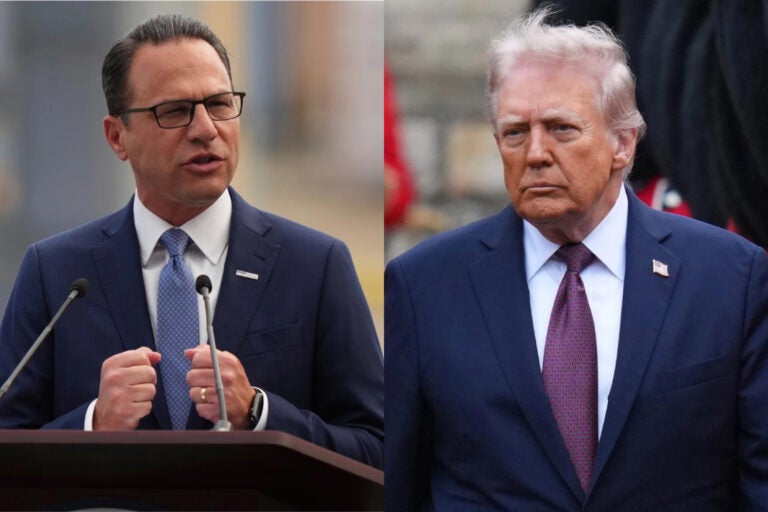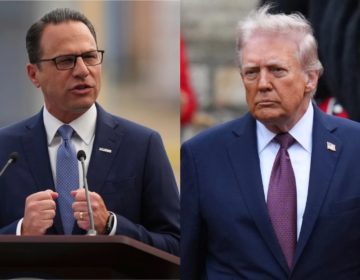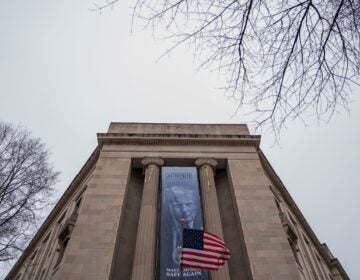Judge protects Pennsylvania — for now — from federal reprisal in food-stamp dispute
State officials say they are open to sharing the data — if it isn't shared with other agencies.

Pennsylvania Gov. Josh Shapiro (left) and President Donald Trump. (Matt Slocum/Kirsty Wigglesworth/Associated Press)
This story originally appeared on WESA.
A federal judge has ruled that, for now, Pennsylvania will not lose millions of federal dollars for refusing to turn over personal data about food-stamp recipients.
On Monday, California federal judge Maxine Chesney granted an order to include Pennsylvania in a temporary pause she’d previously granted to other states. The move is the latest development in a dispute over the Trump administration’s demand for personal information about those benefiting from the food stamp program.
The U.S. Department of Agriculture has been seeking information about 2 million Pennsylvanians who rely on the Supplemental Nutrition Assistance Program, often called SNAP. The agency says it’s part of an effort to reduce fraud and waste — and it has threatened to withhold federal funds from states that don’t comply.
More than 20 states sued over similar demands in July: Pennsylvania joined late, as of last week. And although the state does not offer food-assistance benefits to undocumented immigrants, advocates worry the Trump administration will use the information for ICE enforcement, in cases where the immigrants may share households with beneficiaries.
Officials with the U.S. Department of Justice wrote in a Sept. 26 court filing that the state was interfering with a key effort to ensure benefits were being properly spent.
In other states, they wrote, “USDA has identified instances of inter- and intra-State duplicate enrollment that implicate up to an estimated $1.1 billion, annualized, as well as over 300,000 potential instances of deceased individuals actively receiving SNAP benefits.” They said the agency also identified nearly 4,000 households receiving benefits who should have been disqualified.
“[T]here is surely more improper spending to be found in the data that PA [Department of Human Services] refuses to provide,” they argued.
Attorneys for Gov. Josh Shapiro’s office countered that as the USDA “delivered escalating threats” to dock the state nearly half-a-billion dollars each year, the state offered a compromise. It said it would hand over Social Security, name and address information for food-stamp recipients if USDA agreed not to share the data with other agencies. But the offer was rejected, the state said, with USDA instead threatening to “disallow” $460 million yearly of the state’s funding — roughly 10 percent of its total — in reprisal.
“Governor Shapiro is only in court because USDA was not a willing partner,” wrote state attorneys, led by General Counsel Jennifer Selber, in a Sept. 28 filing. (The state also contended that USDA wouldn’t offer an alternative to Box.com to transmit the data, which the state said it would not use.)
It’s unclear how much SNAP data the Trump administration has so far vetted. (Last year, an average of 41.7 million people were enrolled in the program nationwide, and the number fluctuates month-to-month.)
“Pennsylvania was one of the first states to join the SNAP National Accuracy Clearinghouse to ensure SNAP recipients are not receiving benefits in multiple states and further assist with eligibility determinations,” said Ali Fogarty, a state human services spokesperson, in a late Tuesday statement. “DHS already reviews every SNAP application in a thorough review process that involves more than 10 checks, including citizenship status. It’s irresponsible to speculate anything about Pennsylvania’s SNAP data without first reviewing it.”
The temporary restraining order Chesney granted to Pennsylvania this week comes despite federal arguments that the state waited too long to get into the legal battle.
DOJ attorneys contended that the state had “months-long awareness of the legal issues involved in this litigation, underscoring that Governor Shapiro could, and should, have brought any request for emergency relief long ago.”
“Governor Shapiro makes little effort to explain the months-long delay, or why he did not join the prior request for injunctive relief, relying instead on a vague reference to ‘procedural complexities,’” DOJ attorneys wrote.
State officials have shared little information about why Shapiro did not initially join the lawsuit, but the governor has sued the administration on numerous occasions since Donald Trump returned to power this year. In the past, Shapiro has said he prefers not to file a lawsuit as an opening move.
The order will last at least until a hearing scheduled for Oct. 9.

Get daily updates from WHYY News!
WHYY is your source for fact-based, in-depth journalism and information. As a nonprofit organization, we rely on financial support from readers like you. Please give today.




